|
|
|
Sort Order |
|
|
|
Items / Page
|
|
|
|
|
|
|
| Srl | Item |
| 1 |
ID:
101598
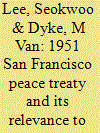

|
|
|
|
|
| Publication |
2010.
|
| Summary/Abstract |
The 1951 San Francisco Peace Treaty ending World War II in the Pacific does not include any language regarding sovereignty over Dokdo, the islets situated in the East Sea/Sea of Japan between Korea and Japan. Earlier drafts had addressed this issue, but language on Dokdo was omitted because of the urgency of completing the Peace Treaty and the outbreak of the Korean War. Earlier documents issued by the Allied Powers had separated Dokdo from Japan's main islands, Korea has strong historical evidence to support its claim to the islets and it has exercised effective occupation over them since the early 1950s. Japan agreed to a Normalization Treaty with Korea in 1965 without insisting on any language referring to Dokdo. Although Japan continues to protest Korea's occupation of Dokdo, its claim is not strengthened by absence of any reference to these islets in the text of the San Francisco Peace Treaty.
|
|
|
|
|
|
|
|
|
|
|
|
|
|
|
|
| 2 |
ID:
062978


|
|
|
| 3 |
ID:
124384
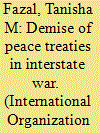

|
|
|
|
|
| Publication |
2013.
|
| Summary/Abstract |
The conclusion of peace treaties following war was a norm of international politics for millennia. Since approximately 1950, however, the rate at which interstate wars have ended with a formal peace treaty has declined dramatically. I argue that the costs of concluding peace treaties have risen with the development of the modern canon of the law of war. Using an original data set, I find that states today prefer to avoid admitting to a state of war and risk placing their leaders and soldiers at risk of punishment for any violations of the law of war.
|
|
|
|
|
|
|
|
|
|
|
|
|
|
|
|
| 4 |
ID:
129795


|
|
|
|
|
| Publication |
2014.
|
| Summary/Abstract |
U.S. Secretary of State John Kerry has done an admirable job of creating an "architecture of peace" to support the negotiations launched in July 2013. He engineered the appointment of retired U.S. General John Allen to delve deeply into Israel's security requirements following a peace treaty, recognizing that the security dilemmas would range far beyond the immediate challenges of securing an Israeli-Palestinian border. Kerry understood that Israel's readiness to take the risks associated with withdrawal from the Occupied Palestinian Territories (OPT) would be influenced directly by the degree to which Israel's security requirements were taken into account.
|
|
|
|
|
|
|
|
|
|
|
|
|
|
|
|
| 5 |
ID:
062912


|
|
|
| 6 |
ID:
111577


|
|
|
|
|
| Publication |
2012.
|
| Summary/Abstract |
The latest round of negotiations to solve the Cyprus problem commenced in 2008 with a pledge to submit any agreement to separate simultaneous referenda. Unlike the aborted Annan Plan that was rejected in referenda in 2004, this round of negotiations was meant to be qualitatively different in being for and by "Cypriots." This article assesses the negotiations given the 2004 precedent and legacies. Does the current process entail a qualitatively different approach to design that could affect the outcome of a future referendum? Opportunities to bring citizens into the process have been missed. Moreover, due to stalemates, the international mediators have had to exert more pressure, leading to internationalization and nullifying the "Cypriot-led" process.
|
|
|
|
|
|
|
|
|
|
|
|
|
|
|
|
| 7 |
ID:
183980
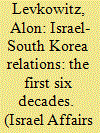

|
|
|
|
|
| Summary/Abstract |
This article examines relations between the Republic of Korea (South Korea) and the State of Israel from the establishment of diplomatic relations in 1962 to 2020. It analyses the internal and external factors influencing their foreign and security policies as well as mutual misunderstandings and the attendant problems, notably the failure to sign a free trade agreement till 2020. Despite these difficulties, and the geostrategic complexity of the Middle East, especially the Persian Gulf, that influences Seoul’s interests in the region and its relations with Israel, the bilateral relationship will further improve once the free trade agreement is ratified by both states.
|
|
|
|
|
|
|
|
|
|
|
|
|
|
|
|
| 8 |
ID:
178535


|
|
|
| 9 |
ID:
189417


|
|
|
|
|
| Summary/Abstract |
In the wake of the October 1973 war, Moscow sought superpower collaboration that would ensure its participation in the nascent Arab-Israel peace process, but the direct Israeli-Egyptian negotiations that culminated in the September 1978 Camp David Accords foiled this plan. As a result, the Soviets launched a diplomatic offensive against the deal and tried to forge an Arab front to isolate Egypt, only to see Cairo and Jerusalem signing a fully fledged peace treaty in March 1979. Then came the Iran–Iraq war (1980–88) and further shattered Moscow’s Middle Eastern stance as fears of Tehran’s hegemonic designs led to Egypt’s reincorporation into the Arab fold.
|
|
|
|
|
|
|
|
|
|
|
|
|
|
|
|
| 10 |
ID:
160346


|
|
|
|
|
| Summary/Abstract |
A successful North Korea–U.S. summit is expected to make a breakthrough in the
denuclearization of the North. Nevertheless, considering the lessons learned from
past denuclearization negotiations, and Pyongyang’s nuclear capacity and will
for nuclear development, a solely optimistic outlook is not advisable. In order to
pursue successful denuclearization negotiations, a precise understanding of new
negotiation conditions, particularly each party’s negotiation strategy and leverage,
and application of them is very important. Also, a substantive negotiation strategy
and roadmap for the denuclearization should be prepared to be able to pressure and
reach an agreement with North Korea. Taking account of the negotiation leverage
of North Korea and the United States, a one-sided negotiation with North Korea
surrendering to the United States is not likely. This paper aims to provide a practical
negotiation strategy and a roadmap for the denuclearization of North Korea
reflecting the current security situation surrounding the Korean Peninsula.
|
|
|
|
|
|
|
|
|
|
|
|
|
|
|
|
| 11 |
ID:
106317
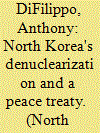

|
|
|
|
|
| Publication |
2011.
|
| Summary/Abstract |
This short paper examines the issue of the continued absence of a peace treaty to end the Korean War. Although the hostilities associated with the Korean War ended in 1953, it was the "temporary" Armistice Agreement and not a formal peace treaty that did this. After reviewing the history of discussions on a peace treaty, this paper focuses on the current North Korean nuclear issue. It demonstrates that a conditional peace treaty is a very pragmatic way to end the Korean War and to determine if Pyongyang, as it has stated repeatedly, wants to forsake its nuclear weapons, the programs it uses to produce them, and thus to denuclearize the Korean Peninsula. A conditional peace treaty, which effectively is win-win diplomacy for Washington and Pyongyang, will also improve the security environment in Northeast Asia and lay the political ground for improved relations between the two Koreas and between North Korea and Japan.
That no peace treaty was ever created to end the Korean War since the fighting was stopped by an armistice in 1953 has been one of the major sources of instability in Northeast Asia, where there still exists the very the palpable residual of the Cold War. The armistice was meant to end the hostilities on the Korean Peninsula only until a permanent peace treaty could be negotiated. More than a half century later, this has not happened. A peace treaty linked to North Korea's denuclearization gives the Obama administration a new and viable option with which to fundamentally change the security environment in Northeast Asia.
|
|
|
|
|
|
|
|
|
|
|
|
|
|
|
|
| 12 |
ID:
141770


|
|
|
| 13 |
ID:
101955
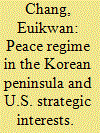

|
|
|
| 14 |
ID:
178536


|
|
|
|
|
| Summary/Abstract |
Jordan had various expectations when it initially signed the peace treaty with Israel. The Jordanians believed that the peace with Israel, coming after the Oslo Accords, would pave the way for a strategic understanding with Israel on the establishment of a Palestinian state in the West Bank (including Arab Jerusalem) and Gaza. Such an understanding, they believed, would finally rid them of the nightmare of the ‘alternative homeland’ scenario, that ‘Jordan is Palestine’. Secondly the Jordanians assumed that the economic ‘fruits of peace’ with Israel would extricate Jordan from its perennial economic woes. Jordan would be both secure and prosperous. None of these assumptions actually materialized. The Jordanians are, therefore, profoundly disappointed by the treaty and its real results. They are as fearful as ever of the ‘alternative homeland’ scenario, and they are still suffering, as always, from an economy perpetually on the brink.
|
|
|
|
|
|
|
|
|
|
|
|
|
|
|
|
| 15 |
ID:
092003


|
|
|
|
|
| Publication |
2009.
|
| Summary/Abstract |
The rollback of North Korea's nuclear program is closely interwined with the peace process in the Korean peninsula and resuscitation of the Nuclear Nonproliferation Treaty(NPT). With the recent thaw in U.S.-North Korea relations, a new opportunity is emerging for the two koreas and the United States. The international community and the concerned parties cannot afford another failure given the imminent danger of the current security siuation on the peninsula and the resulting pressing need for peace building. It is time for them to make a serious effort to bring about a Korean peace that would, in turn, contribute to peace, prosperity, and democracy in the region and the rest of the world. This article looks at policy alternatives that will effectively bring solid and lasting peace to the Korean peninsula.
|
|
|
|
|
|
|
|
|
|
|
|
|
|
|
|
| 16 |
ID:
126851
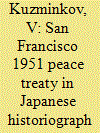

|
|
|
|
|
| Publication |
2013.
|
| Summary/Abstract |
The article examines the interpretation of the 1951 San Francisco Peace Treaty in Japanese historiography (the treaty put an end to the state of war between the Allied states and Japan and returned sovereignty to the latter). The author expounds his point of view on the results of the San Francisco peace process on the basis of a comprehensive analysis of a multitude of documents and assesses arguments of Japan's academic community representatives.
|
|
|
|
|
|
|
|
|
|
|
|
|
|
|
|
| 17 |
ID:
097347
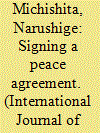

|
|
|
| 18 |
ID:
023890
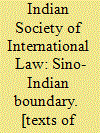

|
|
|
|
|
| Publication |
New Delhi, Indian Society of International, 1962.
|
| Description |
49p.
|
|
|
|
|
|
|
|
|
|
|
|
Copies: C:1/I:0,R:0,Q:0
Circulation
| Accession# | Call# | Current Location | Status | Policy | Location |
| 014134 | 341.42026654041/IND 014134 | Main | On Shelf | General | |
|
|
|
|
| 19 |
ID:
132076
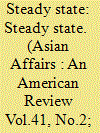

|
|
|
|
|
| Publication |
2014.
|
| Summary/Abstract |
Inherent to the United States' approach toward the Democratic People's Republic of Korea (DPRK) since the second North Korean nuclear issue emerged in the early fall of 2002 has been a policy predisposition that has coexisted with little tangible movement in the direction of resolving this very serious regional and global problem. Indeed, since its inception, overall this problem has become worse. That the DPRK has detonated three nuclear bombs hardly makes the security environment in Northeast Asia more stable, contrary to Pyongyang's claims that its nuclear deterrent force does just that, or brings the North Korean nuclear issue any closer to resolution. For sure, major missteps by Pyongyang have exacerbated the nuclear issue. Moreover, because the Bush and Obama administrations have maintained this predisposition embedded in U.S. ideology, which like any belief system, including the DPRK's juche (self reliance) idea, begets emotion accompanied by both self-deception and deception on the part of state officials, policies implemented by Washington in response to the North's perceived provocations have produced few successes. Policies built on faulty foundations, specifically those that exude the animus of the Cold War, are more likely to fail than not. This paper concludes by providing a practical solution to the North Korean nuclear issue, which should be attractive to both Washington and Pyongyang: a conditional peace treaty that rather quickly leads to the DPRK's denuclearization.
|
|
|
|
|
|
|
|
|
|
|
|
|
|
|
|
| 20 |
ID:
166015
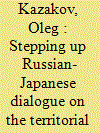

|
|
|
|
|
| Summary/Abstract |
The stepping up of Russian-Japanese relations initiated in 2016 by RF President Vladimir Putin and Japanese Prime Minister Shinzo Abe has led to the next stage of discussing the need to conclude a peace treaty to resolve the territorial issue. Japan has traditionally continued to insist on "the return of the Northern Territories." However, the position of Moscow, which favors signing a peace treaty based on the Soviet-Japanese Joint Declaration of 1956, evokes a negative reaction, primarily among the Russian public.
|
|
|
|
|
|
|
|
|
|
|
|
|
|
|
|
|
|
|
|
|